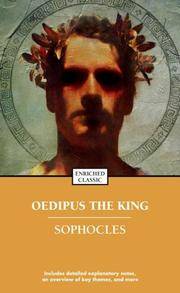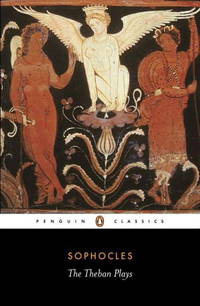According to the Suda he wrote 123 plays; in the dramatic competitions of the Festival of Dionysus (where each submission by one playwright consisted of four plays, three
Tragedies and a semi-comic satyr play), he won more first prizes (around 20) than any other playwright, and placed second in all others he participated in (Lloyd-Jones 1994: 8). His first victory was in 468, although scholars are no longer certain that this was the first time that he competed (Scullion 2002).
Only seven of his tragedies have survived complete in the medieval manuscript tradition. The most famous are the three tragedies concerning Antigone: these are often known as the
Theban Plays or
The Oedipus Cycle, although they do not make up a single trilogy. Discoveries of papyri from the late nineteenth century onwards, especially at Oxyrhynchus, have greatly added to our knowledge of Sophocles' works. The most substantial fragment which has so far appeared contains around half of a satyr play, The Tracking Satyrs.
Sophocles was born about a mile northwest of Athens in the rural deme (small community) of Colonus Hippius in Attica, which today is near the railway station. His birth took place a few years before the Battle of Marathon in 490 BC: the exact year is unclear, although 497/6 is perhaps most likely (Lloyd-Jones 1994: 7). The ancient life of Sophocles disputes claims that his father, Sophillus, was a carpenter, smith, or swordmaker, asserting rather that he owned slaves who pursued such occupations. The Life goes on to say the young Sophocles won awards in wrestling and music, and was graceful and handsome. He led the chorus of naked boys (paean) at the Athenian celebration of the victory against the Persians at the Battle of Salamis in 480 BC.
Sophocles enjoyed a public profile outside the theatre. In 443/2 he served as one of the Hellenotamiai or treasurers of Athena. The Athenian people elected him as one of the ten generals for 441/0, during which he participated in the crushing of the revolt of Samos. There is some evidence that he was one of the commissioners appointed in 413 BC as a response to the catastrophic destruction of the Athenian expeditionary force in Sicily (Lloyd-Jones 1994: 12-13). Sophocles also served as a priest for a time.
Only two of the seven surviving plays have securely dated first performances:
Oedipus the King coming in Sophocles' middle period


































